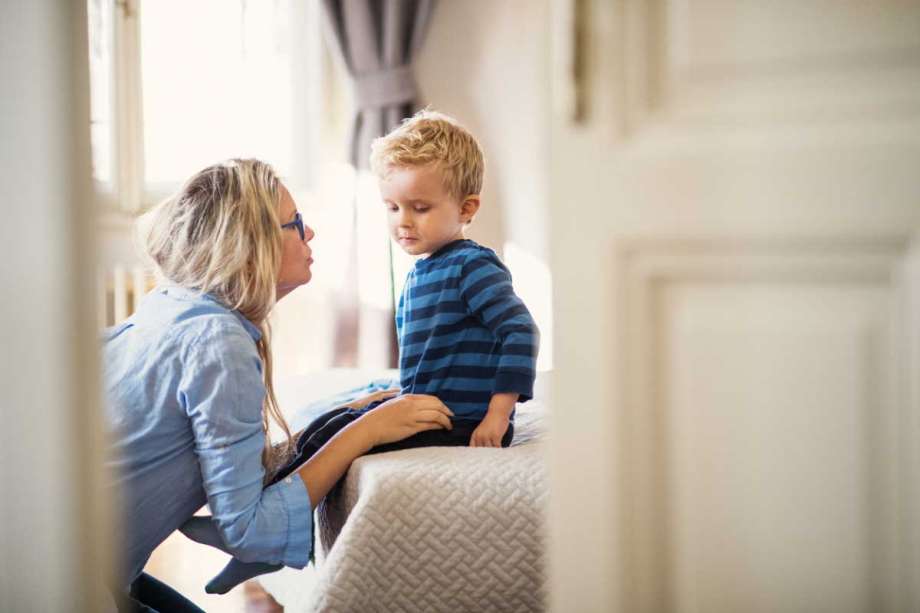10 Positive Parenting Phrases to Use With Toddlers

Have you ever had a frustrating day with your toddler and at the end of it, you find yourself wanting to yell and scream? According to Heather Wallace, a Love and Logic facilitator, the way you phrase things can make a big difference with little ones.
“Just a change in the way you state something to a toddler will make a huge difference in your toddler’s cooperation level. Negative phrases kick children into fight or flight mode. When their brains are in this state, they do not hear the words that you are saying and no learning can take place. Using positive phrases keeps the child in that learning and cooperative state of the brain so that you and your toddler can work together to accomplish your goal.”
More: The Ultimate Guide to the Tone of Voice to Use When Disciplining Kids
Keeping that thought process in mind, we must program ourselves to move from negatively engaging our toddlers when we are frustrated, and instead focusing on the positive. Here are 10 positive phrases to use when your toddler just won’t listen.
Don’t have time to read now? Pin it for later:
"Please talk softly."
When your toddler isn’t listening, rather than pointing out what you don’t like (stop yelling, why are you screaming, etc.) try to focus on the behavior you would like to see.
"I need you to…"
...turn on your listening ears, tiptoe like a mouse, take a deep breath...you name it. Be specific and make it fun! Children are more likely to turn their behavior around when given a more engaging way to respond.
"Let’s take a deep breath."
Breathe with your toddler, even if you start out alone by demonstrating deep breaths they may join in. Once they are more relaxed and calm they will be able to focus on what you are asking and turn into a better listener.
"That was really disappointing (frustrating, scary, sad); it’s OK to cry."
Child Development Specialist Brittany McCabe states that we need to “validate their feelings. It is important for them to know that you understand how they are thinking and feeling about a topic.” By helping to put words to their feelings and validating those emotions we are helping to empower our toddlers.
"Show me kind and gentle."
Our first reaction typically is to tell our children to stop something. For example, “no hitting, stop throwing, why are you pushing?” Instead if we are able to give them something specific to demonstrate, they will likely understand our requests more.
"Would you like to do it on your own or have me help you?"
Brittany also advises, “Give them choices and autonomy, which will help the power struggles and also help to build confidence and independence.” When given the choice some children would appreciate help; however if we always jump in and do it for them, they will not gain the confidence and independence to complete tasks on their own when asked.
"We all make mistakes. Would you like a big hug until you feel better?"
By acknowledging that we all make mistakes, you may be able to eliminate some of the frustration a toddler feels in themselves. They are navigating their world and discovering what works and what doesn’t, but having the comfort of an adult close by is also important.
"It’s OK to feel how you feel. It’s not OK to…"
Help establish boundaries now by stating what is and is not OK. For example, “It’s OK to be angry, but it is not OK to throw your toys.” Depending on the age of your toddler you can even take this further by explaining what they can do instead.
"I get angry sometimes, too; let’s figure this out together."
Even when our toddlers are not listening, it is important for us to let them know that they are not alone. We may be disappointed in their behavior, but we still love them. Let them know that they are supported and that you will help them find a better solution.
"I hear you need space; I’ll be over here when you need me."
Brittany recommends that you “do not expect them to listen to the instruction if they’re crying. Instead, you need to comfort them and make a connection and let them know you understand them. They cannot hear your feelings until they know theirs is heard first.” Sometimes a few minutes alone is what children need to regroup and come back ready to listen.
Brittany reminds us that “when it comes to positive parenting, it is important to respect your child as an individual who has their own thoughts, needs, and feelings about topics. If you just put your agenda on children, it is not going to go your way.” These positive phrases are likely to help strengthen your relationship with your toddler and help them grow into children who respect themselves and others.
If you are practicing positive parenting, you may want to consider the latest parenting trend of conscious discipline.

